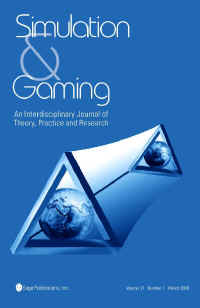|
 |
||
|
NB - Please
follow all indications regarding ms ID, writing,
etc. |
|
All standard manuscripts submitted to S&G for publication must be written within the spirit, scope and format of the journal. All submissions must be original work, except of course citations. To make sure that your manuscript is correctly written, please consult both:
- recent issues of the journal or several already published articles and
- this Guide for S&G Authors.
Before submitting your ms, you must obtain a Ms ID.
The Guide is couched in rather dogmatic terms because it is vital that the instructions are followed carefully at the outset. Submissions will not be processed until they conform to this Guide.
This Guide is in several sections. These are clustered into three broad areas:
- Overview. The scope of S&G, the substance of articles, the types of article published in S&G. It also contains special author guides for reviews and for ready-to-use games.
- Process: The things that you must do, such as getting a ms ID, having your ms reviewed, and sending the author agreement. Before you send a ms, you must request a ms ID.
- Structure: The things that you must include in your ms, to get your ms into shape for review and publication, such as laying out your ms in certain ways or including certain elements (abstract, keywords, etc.). The check list will help you here.
- Follow-up: How to get cited.
- Guest: Notes to help you prepare a proposal to guest edit a symposium issue of S&G.
To navigate the pages of this Guide for S&G Authors, you may use the following:
- the header of these pages.
- the panel to the left.
- the Table of Contents.
- the links in each page.
Other information regarding S&G is in other parts of this web:
- About S&G: The editorial Board, contacts, subscription, past issues, organizations, ... .
- Resources: Bibliographies, articles, CFPs, links, searches, ... .
Some thoughts to guide our simulation/gaming endeavours
I do not know what I may appear to the world; but to myself I seem to have been only like a boy playing on the seashore, and diverting myself in now and then finding of a smoother pebble or a prettier shell than ordinary, whilst the great ocean of truth lay all undiscovered before me. Sir Isaac Newton (1642-1727) English physicist, mathematician.
The aim of science is to seek the simplest explanation of complex facts. We are apt to fall into the error of thinking that the facts are simple because simplicity is the goal of our quest. The guiding motto in the life of every natural philosopher should be "Seek simplicity and distrust it.'' Alfred North Whitehead (1861-1947) English mathematician and philosopher. Concepts of Nature, p. 163.
- The most beautiful experience we can have is the mysterious. It is the fundamental emotion which stands at the cradle of true art and true science. Albert Einstein (1879-1955) U. S. physicist, born in Germany.
- One thing I have learned in a long life: that all our science, measured against reality, is primitive and childlike and yet it is the most precious thing we have. Albert Einstein (1879-1955) U. S. physicist, born in Germany.
- Whoever undertakes to set himself up as a judge in the field of Truth and Knowledge is shipwrecked by the laughter of the gods. Albert Einstein (1879-1955) U. S. physicist, born in Germany.
The Guide for S&G Authors was
prepared by David Crookall (Editor, S&G).
Many thanks to Kate Peterson (Sage Publications) & to Warren Thorngate (Carleton
University) for comments on earlier versions
of this guide.
©
1999 & 2004, by David Crookall &
Sage Publications |

